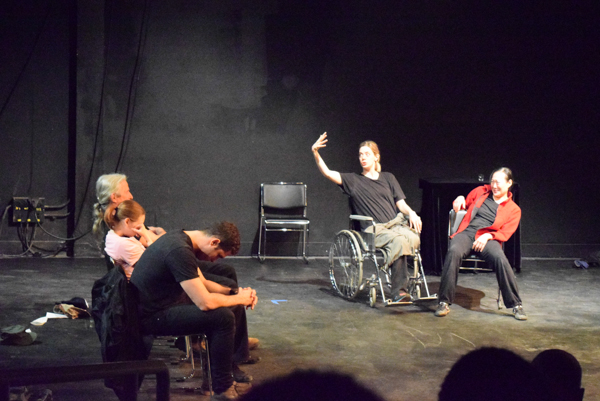
Coming back from war is challenging. Even when a veteran arrives home, they often cannot completely escape the battlefield. Veterans have to overcome various issues, including but not limited to post-traumatic stress disorder (PTSD), injuries, substance abuse, hypervigilance and suicidal thoughts.
The March 10 showing of “The Veterans’ Project: Leaving Theatre” at Parker Theatre highlighted all of these issues, artfully demonstrating them in a play performed by veteran and civilian actors.
The approximately 20-minute play was written collaboratively by the cast and producer Fay Simpson, and portrayed the struggles that haunted veteran Alice Cheng, played by actress Hwalan Shub. When the show was finished, Simpson and the cast members invited the audience to help answer questions regarding veterans’ issues, and even come on stage to speak with the characters of the play. The event not only served as a performance for all to enjoy, but an open discussion on troubles faced by veterans around the country.
The play began with a combat scene, where a group of soldiers are engaged in battle. An explosion goes off with a booming blare, sending all of the soldiers to the ground. As the aftereffects cleared, it became apparent that one of the soldiers, played by actress Brenna Palughi, was hit by the blast and lost her leg.
Following this event is the withdrawal of the soldiers as they are finally able to go home. Before they leave, an attendant asks them if they would like to stay an extra month for psychiatric treatment, or take a pamphlet and go home. The choice was obvious for the veterans: they wanted to get home as soon as possible, even if they were not yet mentally stable.
All of the soldiers tried to live their lives normally after coming home, but they could not free themselves from the memories of war. The veterans, including Cheng, were depicted as going about their day normally, until loud sounds set off their PTSD, sending them into combat positions they were so used to.
Cheng later finds herself at a bar and is hit on by a male stranger. She reacts violently, assaulting him with her fists and hitting him with a chair before being restrained. When Cheng became violent and lost control of herself, the scene became slow-motion. All of the actors slowed their movements down to a crawl, as atmospheric sounds emphasized the situation, which made the violence seem heavy and compulsive.
After being arrested, Cheng is sent to a psychiatrist at a veteran’s hospital. He is not very respectful and asks her to speak about her experiences by rating them on a scale of one to 10. He is completely unaware that Cheng was affected by depleted uranium, meaning she could not have children. Cheng does not come out of the appointment feeling any better. She leaves with prescription drugs that are supposed to help her. She does not know where to live, as she has not yet found a home.
After her appointment, she finds her comrade who lost her leg. Cheng feels intense guilt about her soldier’s injuries, and blames it on herself, as she was the commanding officer who ordered the soldier into position when the explosion went off.
On drugs and alcohol, feeling that she let her friend down and with nowhere to go, Cheng decides that she has no options. She raises a gun to her own head, as all of her fellow soldiers symbolically line up behind her, raising salutes in the same way she raises her weapon.
At this shocking moment of climax, Iraq Veteran Jennifer Pacanowski walked in front of the crowd.
“Stop the show,” she said.
After stopping the play and giving the audience a few seconds to collect themselves, Pacanowski asked an important question to the crowd.
“What is happening here?” Pacanowski said. “Are there any moments along the way where things could have turned out differently?”
Several members of the audience addressed problems with the way Cheng was treated right from the start, such as being allowed to leave for home without getting any psychiatric treatment.
The audience also found that the psychiatrist who spoke to Cheng did a poor job and left her feeling like she had no support system.
Bruce E. Brown, former Staff Sergeant in the U.S. Marine Corps, could sympathize with the feeling of guilt Cheng felt about her comrade who had lost her leg.
“When you are a squadron leader, you are in control of the lives of your soldiers, and responsible for anything that happens to them,” Brown said.
Brown talked about how difficult it is for a commanding officer to see soldiers die or suffer injuries, especially since most of them are very young.
After audience members were finished giving their thoughts, the play was rewound to create a better result for Cheng. The psychiatrist focused on getting Cheng a place to stay and invited her to his support group where she could talk to other veterans about her problems.
Cheng was then able to deal with the guilt she felt about her comrade’s injury. She was given help in many ways, not just prescription drugs that only compounded her problems.
“The Veterans’ Project: Leaving Theatre” was an amazing experience, shedding light on a problem that many know nothing about in theatrical fashion.
Even though the performance did not feature a set, the dramatic sound effects and professional characterization made every scene seem very real. The way in which they were able to depict the effects of PTSD was nothing short of amazing.
Veteran suicide is an ongoing phenomenon in the United States. A 2013 report from the United States Department of Veterans Affairs estimated that roughly 22 veterans commit suicide a day on average.
“The Veterans’ Project: Leaving Theatre” revealed that there are many factors which play into the statistic and that there are better ways to treat veterans so they can live healthy lives after serving.
